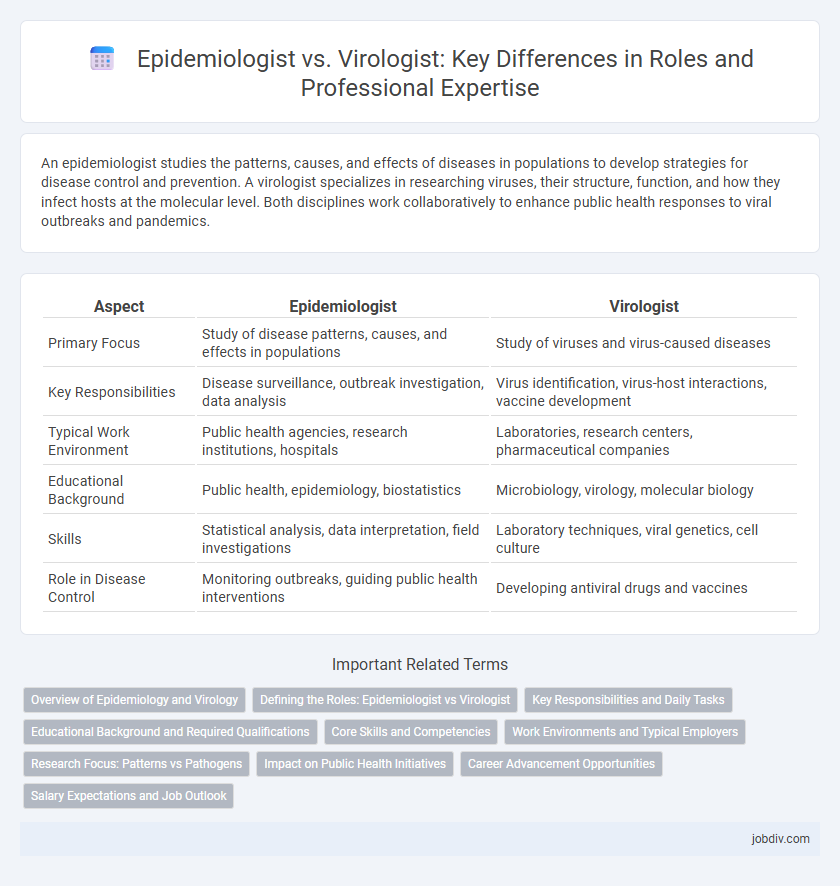An epidemiologist studies the patterns, causes, and effects of diseases in populations to develop strategies for disease control and prevention. A virologist specializes in researching viruses, their structure, function, and how they infect hosts at the molecular level. Both disciplines work collaboratively to enhance public health responses to viral outbreaks and pandemics.
Table of Comparison
| Aspect | Epidemiologist | Virologist |
|---|---|---|
| Primary Focus | Study of disease patterns, causes, and effects in populations | Study of viruses and virus-caused diseases |
| Key Responsibilities | Disease surveillance, outbreak investigation, data analysis | Virus identification, virus-host interactions, vaccine development |
| Typical Work Environment | Public health agencies, research institutions, hospitals | Laboratories, research centers, pharmaceutical companies |
| Educational Background | Public health, epidemiology, biostatistics | Microbiology, virology, molecular biology |
| Skills | Statistical analysis, data interpretation, field investigations | Laboratory techniques, viral genetics, cell culture |
| Role in Disease Control | Monitoring outbreaks, guiding public health interventions | Developing antiviral drugs and vaccines |
Overview of Epidemiology and Virology
Epidemiology studies the distribution, patterns, and determinants of health and diseases in populations to control and prevent outbreaks through data analysis and research. Virology specializes in the biology, structure, function, and genetics of viruses, including their interaction with host organisms and mechanisms of infection. Together, these fields provide critical insights for public health by tracking disease transmission and developing strategies to mitigate viral threats.
Defining the Roles: Epidemiologist vs Virologist
Epidemiologists analyze patterns, causes, and effects of health and disease conditions in populations, focusing on outbreak tracking and public health strategies. Virologists specialize in studying viruses at a molecular and cellular level, investigating viral structure, replication, and pathogenesis. Both professions collaborate to control infectious diseases, with epidemiologists guiding population-level interventions and virologists providing laboratory-based insights on viral behavior.
Key Responsibilities and Daily Tasks
Epidemiologists analyze patterns, causes, and effects of diseases in populations, conducting surveillance, designing studies, and interpreting public health data to inform prevention strategies. Virologists focus on studying viruses at the molecular level, isolating viral strains, conducting laboratory experiments, and developing vaccines or antiviral therapies. Both professionals collaborate in outbreak investigations, but epidemiologists emphasize population-level trends while virologists concentrate on viral mechanisms and pathogenesis.
Educational Background and Required Qualifications
Epidemiologists typically hold a master's or doctoral degree in public health, epidemiology, or a related field, with extensive training in biostatistics, study design, and disease surveillance. Virologists usually earn a Ph.D. in microbiology, virology, or molecular biology, focusing on virus structure, genetics, and pathogenesis through laboratory research. Both professions require strong analytical skills, though epidemiologists emphasize population-level data analysis while virologists prioritize molecular and cellular techniques.
Core Skills and Competencies
Epidemiologists specialize in analyzing patterns, causes, and effects of health and disease conditions in populations, leveraging skills in biostatistics, data analysis, and field investigation to inform public health policies. Virologists focus on studying viruses at the molecular and cellular levels, utilizing expertise in microbiology, laboratory techniques, and immunology to understand viral pathogenesis and develop treatments or vaccines. Both professions require strong analytical skills, scientific knowledge, and the ability to interpret complex data, but epidemiologists emphasize population health trends while virologists concentrate on viral mechanisms and laboratory research.
Work Environments and Typical Employers
Epidemiologists commonly work in public health departments, research institutions, universities, and government agencies such as the Centers for Disease Control and Prevention (CDC). Virologists are frequently employed by pharmaceutical companies, biomedical research labs, clinical laboratories, and academic institutions focusing on infectious diseases. Both professionals may also collaborate in hospitals and international health organizations, but their primary workplaces are distinct based on their specialized roles in studying disease patterns versus virus biology.
Research Focus: Patterns vs Pathogens
Epidemiologists research the distribution, patterns, and determinants of health and disease conditions in populations to identify risk factors and inform public health policies. Virologists specialize in studying viruses, focusing on viral structure, replication, and mechanisms of infection at the molecular and cellular levels. Both disciplines collaborate to control infectious diseases, with epidemiologists analyzing outbreak dynamics and virologists investigating pathogen biology.
Impact on Public Health Initiatives
Epidemiologists analyze disease patterns and transmission within populations to design effective public health strategies, while virologists study the biology and behavior of viruses to inform vaccine development and antiviral treatments. The collaboration between epidemiologists and virologists enhances outbreak response, enabling data-driven interventions that reduce morbidity and mortality rates. Public health initiatives rely on both disciplines to detect emerging viral threats and implement preventive measures at community and global levels.
Career Advancement Opportunities
Epidemiologists advance their careers by specializing in disease patterns, public health policy, and biostatistics, frequently securing roles in governmental agencies or research institutions. Virologists often progress by enhancing expertise in viral pathogenesis, vaccine development, and molecular biology, with career advancement opportunities in pharmaceutical companies, academic research, and clinical laboratories. Both fields offer growth through interdisciplinary collaboration, advanced certifications, and contributions to public health emergencies management.
Salary Expectations and Job Outlook
Epidemiologists typically earn an average annual salary ranging from $70,000 to $120,000, with job growth projected at 5% over the next decade, reflecting steady demand in public health sectors. Virologists often command higher salaries, between $80,000 and $140,000, driven by their specialized expertise in virus research, with industry growth expected around 7% due to ongoing needs in pharmaceuticals and infectious disease control. Both careers offer strong employment prospects, especially as global health challenges increase the need for disease tracking and virus study.
Epidemiologist vs Virologist Infographic

 jobdiv.com
jobdiv.com